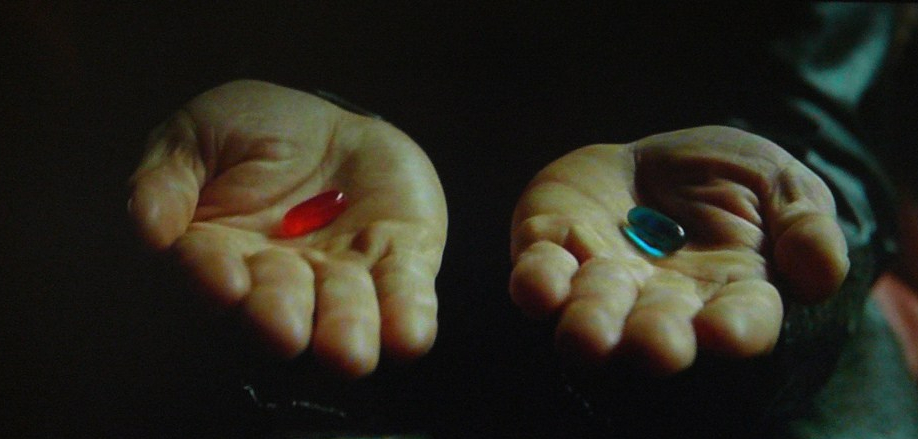I’m not afraid to admit that there are difficulties with theism. There are things that are hard to understand, and there are things that are unpalatable. These problems, however, are nothing – nothing! – compared to the insurmountable problems with atheism.
In fact, out of all the options out there, atheism is by far the least persuasive explanation of the way things are. Here are three reasons why:
1. The existence of evil
If there’s one thing that everyone can agree on, it’s that evil happens in the world. Whether that’s terror attacks, the unfair distribution of wealth, cancer or whatever; most agree that evil is an objective feature of reality. And this, say some atheists, is a good enough reason for rejecting the idea of God (as emoted by Stephen Fry in that interview on RTÉ). To a certain degree, I can understand this view. The world is demonstrably full of evil and it can be difficult to reconcile this fact of reality with a loving God.
For the atheist who is an atheist because of evil, however, this doesn’t get them off the hook. Getting rid of God does not get rid of evil because now the atheist has to solve the problem using the limited resources of naturalism. And they’re not going to get very far with naturalism even making sense of evil, never mind solving it, because, as celebrity atheist Richard Dawkins puts it, “The universe that we observe has precisely the properties we should expect if there is, at bottom, no design, no purpose, no evil, no good, nothing but pitiless indifference”.
In other words, excrement happens.
The existence of evil, therefore, is actually an argument for God. When an atheist says ‘evil,’ they assume there is such a thing as ‘good’. When they assume there’s such a thing as good, they assume there’s such a thing as an objective moral law by which to judge between good and evil. But if they assume an objective moral law exists, then they must posit some sort of lawgiver – which is the very thing they say doesn’t exist!
2. You can’t get living stuff from dead stuff
For atheism to be true, it must meet the minimum requirement of life coming from non-life (abiogenesis). If life can’t be shown to come from non-life, then we can’t even get started. But how did life come from non-life? As yet, nobody has come up with any answers. There are competing theories, of course, but they’re merely starting places offered up by materialists, many of which (all?) have been quickly shot down by other materialists.
And as time goes on and the more we learn about the complexities of chemistry and biochemistry – and even the complexities of the simplest of living cells – we realise that the problem of getting life from non-life is not going to be solved by any naturalistic explanation.
Of course, atheists (at least the ones I’ve engaged with) usually answer this problem with: “Life came from non-life because we’re here. Therefore, it happened.” But this is circular reasoning, the atheist equivalent to, “The bible is true because the bible says it’s true”. It is based on naturalist presuppositions that won’t be disturbed by evidence. It is philosophy, not fact.
3. The existence of consciousness
One of my favourite films from my yoof is The Matrix, a sci-fi action thriller set in a dystopian future where reality turns out to be a computer simulation run by sentient machines – the Matrix. It’s a bit like how the DVLNI works, only with sunglasses and cool music. Early on in the film, the hero, Neo, meets a character called Morpheus, who offers him a choice between taking a red pill, which will show Neo the harsh truth about reality and a blue pill, which will keep him blissfully ignorant.
This is not unlike atheism. Instead of being enslaved and subdued by sentient machines, the logical conclusion of atheism is that humans are enslaved and subdued by an evolutionary need to survive. Our brains are hardwired for survival, nothing more, nothing less. “DNA neither cares nor knows. DNA just is. And we dance to its music,” says Dawkins. On atheism, then, humans are nothing more than fleshy automatons.
The Atheist philosopher and science historian, William Provine, succinctly states:
Let me summarize my views on what modern evolutionary biology tells us loud and clear — and these are basically Darwin’s views. There are no gods, no purposes, and no goal-directed forces of any kind. There is no life after death. When I die, I am absolutely certain that I am going to be dead. That’s the end of me. There is no ultimate foundation for ethics, no ultimate meaning in life, and no free will for humans, either.
Another atheist philosopher, Daniel Dennett, agrees: “Consciousness is an illusion of the brain, for the brain, by the brain.” (Thought: since consciousness is an illusion of the brain, and Dennett used his brain to make that statement, why should our brains believe his brain?)
If these atheists are correct, then things like justice and love are nothing but simple chemical reactions bouncing about in our meat computers. Breathtaking scenery is nothing more than light waves, and music is just bouncing molecules. None of these things is actually real. They are useful fictions that help aid human survival.
But there is an even bigger problem. If consciousness is just an illusion of the brain, then who or what makes our decisions? If consciousness is a mere effect of chemical reactions in the brain, then the conscious act of deciding is not our own, but rather our head meat responding to stimuli beyond our control. There is no such thing as ‘choice’ (sorry all you ‘pro-choice’ atheists out there, that’s a meaningless term on your view), rationality, freethought or consciousness. We are merely slaves, born into evolutionary bondage.
Most atheists, though, take the blue pill. That is, to quote Morpheus, they “wake up in their beds and believe whatever they want to believe”. These are the atheists who believe things like justice and love to be real things, worth fighting for. These are the self-styled ‘freethinkers’ (ha! If only they knew!), who meet up in Premier Inns to discuss which religious aspects of their particular corner of the Matrix they dislike the most.
Then, the higher up the atheism ladder you go, atheists like Dennett and Provine (and others like Sam Harris and Jerry Coyne), take the red pill. These atheists are aware of the true nature and consequences of atheism and are happy to tell us how deep the rabbit hole of atheism goes. They know there is no ultimate meaning, for anything or anyone. In fact, some of them even argue that we could actually be living in a Matrix! Anything but God, I suppose.
So when an atheist rejects God, it’s important to ask the question, “Ok, so God doesn’t exist, now what? What is true, and how would you support it?” Because when you study the alternatives, giving up Christianity is not merely rejecting the hymns you were made to learn in Sunday school or railing against the DUP for tying up the swings on Sunday that one time. It’s giving up on a complete system of thought that underpins the kind of Western culture everyone wants to live in, from justice to compassion to a binding corpus of human rights based on a coherent understanding of what it means to be human – none of which an atheist can ever hope to account for, regardless of which pill they choose.


